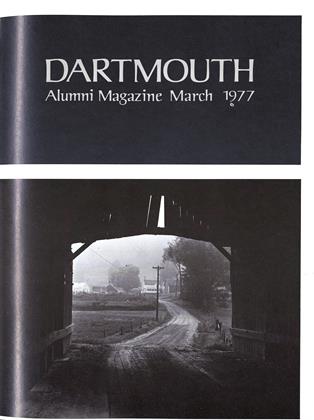This is, by way of first glance, a literary curiosity - a novel published in 1787 by an anonymous author so clandestine that his identity has never been discovered in the 190 years since. Further, it is a novel about the American Revolution, written more or less contemporaneously. And, finally, it has lain fallow in the nearly two centuries (ah, there, bicenten-nialists!) since its first publication and momentary success. Until this reprinting, indeed, there were only about a dozen copies of it extant in this country.
All of the above seem to be copper-plated requirements for entry into the Literary Curiosity Hall of Fame. But, as Professor Noel Perrin correctly points out in his foreword, a nice combination of scholarly deduction and earthy lip-smacking, this book deserves to be reprinted for the only good reason that any book deserves to be reprinted - it is good reading.
Jonathan Corncob, Perrin deduces, was probably written by an Englishman, and perhaps a nautical person. Willy-nilly, it doesn't much matter, once Jonathan is launched "in as snug a farmhouse as any in Massachusetts-Bay," born to his "honoured mother, Mrs. Charity Corncob," who "bred like a rabbit."
That gives just a hint of the prose that follows, prose which somehow prefigures Mark Twain despite Perrin's undoubted good dowse at English springs for it. It can only give the sheerest nuance of the Marx Brothers' picaresque plot turnings and twistings, from British naval service to hurricanes and dalliance in Barbadoes" (and numerous places in between and after), to service on an armed, but wonderously complaisant, brigantine, which struck to an American privateer after no shots were fired because she was outgunned, 16-14.
Well, you can see, it is about as easy to make a synopsis of "Jonathan" as it is to run up a piece for the Reader's Digest on "Tristam Shandy But the-comparison, despite the slightness of Himself's output as against Sterne's, is not so far-fetched. Perrin thinks Sterne the model for the anonymous author of this book, and it certainly seems likely. The humor is as plain-spoken, from Jonathan's shot-gun flight away from Desire Slawbunk, gotten gravid by bundling. to his incredible venereal misadventures with Dinah Donewell, who "looked as modest as a Lucrece.' But, obviously, was not.
There is Captain Furnace of the Royal Navy, as palpable a fraud as W. C. Fields (or Edgar Kennedy), who has "made a particular study of the naval acts of parliament" and therefore habitually refers to things in duplicate, as in "port or place, ship or vessel." Have we not all known his Xerox-like, aship or ashore?
Enough. Read it yourself. And, as they say on the borscht-circuit, "Enjoy!"
Then, offer thanks to Perrin for this gift of gaiety.
THE ADVENTURESOF JONATHAN CORNCOBBy HimselfEdited by Professor Noel PerrinGodine, 1976. 121 pp. $8.95
A connoisseur of the written word. Mr. Farley isa frequent contributor to these pages.
 View Full Issue
View Full Issue
More From This Issue
-
 Feature
FeatureDinner for the Colonel
March 1977 By BRAVIG IMBS -
 Feature
FeatureWomen and Admissions: All Deliberate-speed Ahead
March 1977 -
 Feature
FeatureSleep-filled Days, Gambling Nights
March 1977 By BRAD W. BRINEGAR -
 Feature
FeatureArtists
March 1977 -
 Article
ArticleRambling with Melancholy
March 1977 By JACK DEGANGE -
 Article
ArticleA Versatile, Admirable Teacher With "Every Feature of a Drill Sergeant'(sic)
March 1977 By S.G.
Books
-
 Books
BooksMemories and Anecdotes
January 1916 -
 Books
BooksAlumni Publications
December 1934 -
 Books
BooksFACULTY PUBLICATIONS
March 1942 -
 Books
BooksMOSTLY MAMA.
JUNE 1972 By EDWARD M. POTOKER '53 -
 Books
BooksTHE MEANING OF CULTURE
MARCH 1930 By H. F. West -
 Books
BooksLAWYERS AND THE CONSTITUTION: HOW LAISSEZ FAIRE CAME TO THE SUPREME COURT
October 1942 By Robert K. Carr '29

